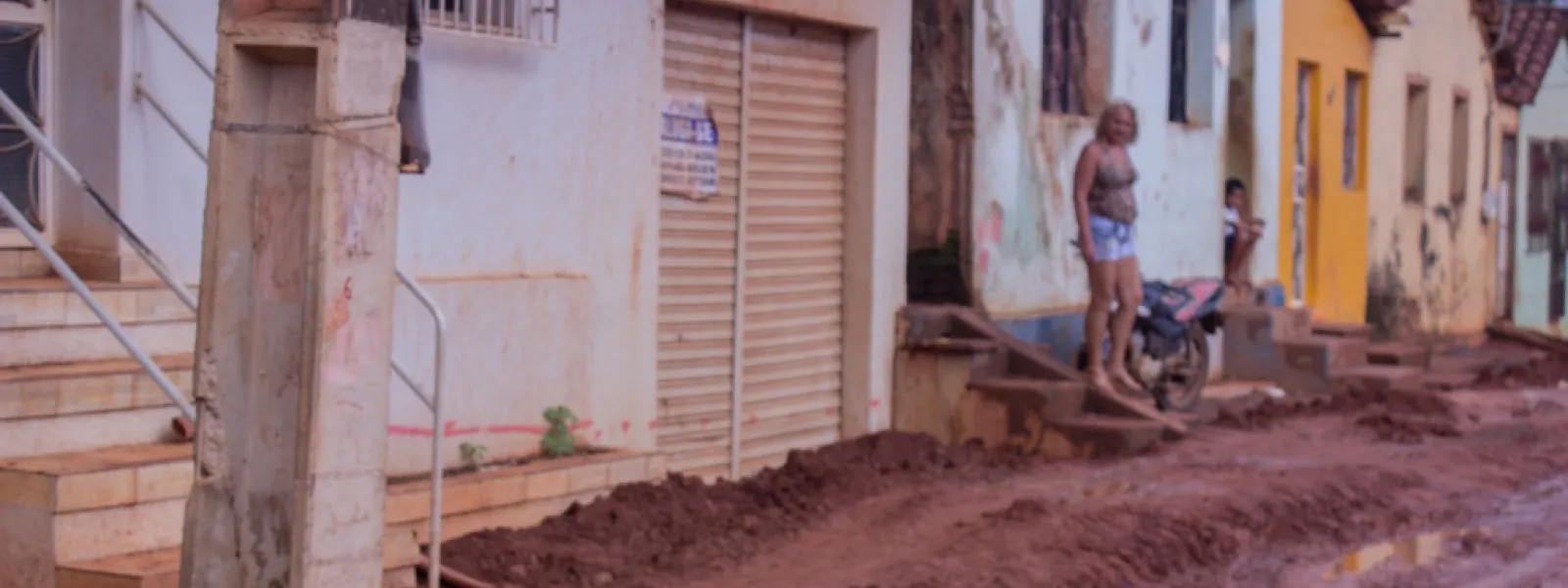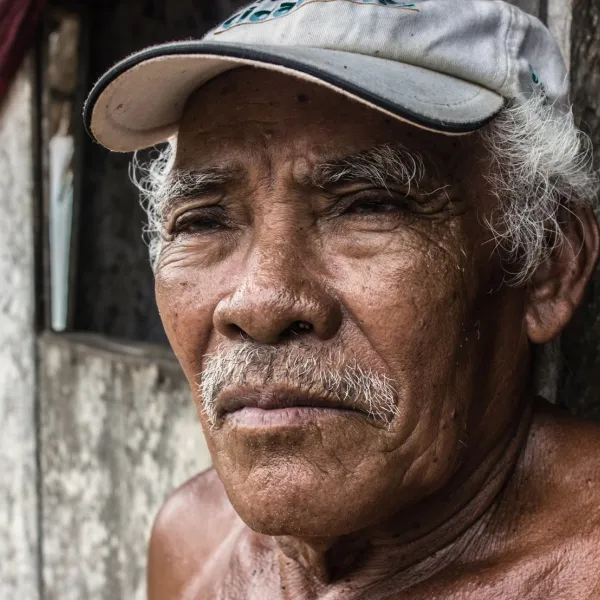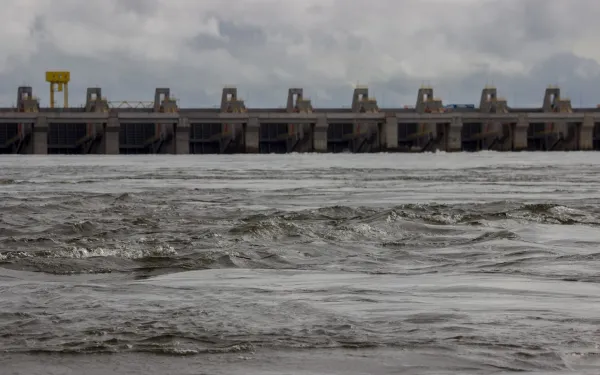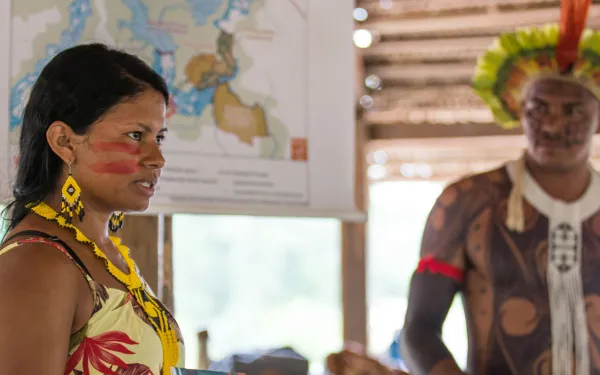
Project
Maíra Irigaray / Amazon WatchFazendo com que o Brasil se responsabilize pelos danos da represa Belo Monte
Quando em pleno funcionamento, Belo Monte será a terceira maior usina hidrelétrica do mundo, construída em um dos ecossistemas mais importantes do planeta: a floresta Amazônica. Localizada no rio Xingu, no Pará, um estado do norte do Brasil, o reservatório cobrirá mais de 500 quilômetros quadrados de florestas e terras agrícolas, uma área do tamanho da cidade de Chicago.
Para a população da Bacia do Xingu, a construção de Belo Monte tem significado a perda do acesso à água, à alimentação, à moradia, ao trabalho e ao transporte. Ao menos 20 mil pessoas serão deslocadas.
O governo e o consórcio encarregado do projeto começaram a construir a usina sem antes consultar primeiro as pessoas da região, muitas das quais são indígenas. Negligenciaram a normativa internacional de direitos humanos, a qual requer o consentimento prévio, livre e informado das comunidade indígenas afetadas. O Brasil também descumpriu as medidas cautelares outorgadas pela Comissão Interamericana de Direitos Humanos, as quais destinavam-se a proteger a vida, saúde e integridade das comunidades.
A represa começou a operar, ainda que não em plena capacidade. Recentemente um tribunal federal suspendeu a Licença de Operação do empreendimento devido à falta de cumprimento, por parte do consórcio, com as obras de saneamento básico em Altamira, cidade diretamente afetada pela hidroelétrica.
Consulta o expediente de fatos do caso
Partners:

Related projects

The first time fracking was discussed before the Inter-American Commission
We heard the news at an exceptional moment. The Latin American Alliance on Fracking had organized a conference; activists, lawyers, NGOs, community organizers, and scientists from seven Latin American countries were meeting face to face in Colombia to work against hydraulic fracturing in the region. It was there we learned that the Inter-American Commission on Human Rights had accepted our request for a hearing. We erupted in collective joy! Not only would we have a new audience, but also fracking would be discussed for the first time before the Commission. Immediately, we channeled our excitement into hard work. We had just 20 days to prepare a 20-minute case that would summarize every negative impact fracking has had in the Americas. We worked day and night to prepare our case for the October 3 hearing in Boulder, Colorado. It was so little time that Gabriel Cherqui, spokesperson for Mapuche communities affected by the Vaca Muerta mega-project in Neuquén, Argentina, couldn’t obtain a visa in time to travel to the United States. Years of work, converted into minutes Perhaps the most difficult aspect of preparing our case was summarizing thousands of documents and stories into such a short amount of time. It had taken years to systematize our specialized research on fracking in the region and to have our case before the Commission—requested with more than 120 supporting signatures—accepted. Another challenge was to demonstrate the solid connection between fracking and human rights violations, an argument we knew the Commission would be interested in addressing, given the scale and complexity of the problem. So we developed a strategy: Roberto Ochandio, a geographer and former petroleum engineer, presented the technical details necessary to understand how fracking works; AIDA attorney Liliana Ávila explained how the technique has violated the rights to a healthy environment, to life, health, and the informed consent of the affected communities; Alejandra Jiménez from the Mexican Alliance Against Fracking presented case studies from Mexico, where communities’ access to water had been compromised by fracking operations; Santiago Cané, from Argentina’s Environmental and Natural Resources Foundation (FARN), exposed the pollution, direct harms, lack of consultation with, and persecution of the communities of Neuquén; and Doris Estela Gutiérrez, president of the Corporation for the Defense of Water, Territory, and Ecosystems (CORDATEC), spoke about the promotion of public consultations in Colombia, as well as the criminalization of and threats to environmental defenders in the country. We emphasized that betting on hydrocarbons and promoting fracking undermines the fight against climate change, since fracking emits methane and other greenhouse gases that accelerate global warming. It was a challenge, to be sure. But we wanted to ensure everyone’s voice was heard. To listen, and learn: a window of hope Based on the response of the Commissioners, it was clear that our case had opened a window of hope. The multifaceted character of fracking—including aspects of development, pollution, climate change and human rights—had captured their interest. Not only was this the first time that fracking had been discussed before of the Commission, it’s worth noting that five speakers had summarized the concerns of more than 120 petitioners, all of whom shared one common cause. What came next was a dialogue in which we responded to the Commissioners’ questions about the technique, their concerns about development in the region, water quality, harms to public health, and concerns about fracking moving nations further away from their climate goals. We requested that the Commission urge States to: adopt measures to avoid human rights violations caused by fracking; generate public, truthful and impartial information based on scientific evidence; and protect human rights protections in cases where the technique is advancing blindly. Going forward, we asked that the Commission follow up on the issue, particularly on the negative impacts fracking has on economic, social and cultural rights; on the lives of women, children and adolescents; and on the lives and territories of indigenous peoples. We requested that the Commission follow up on the attacks against human rights defenders and seek protective measures for those at risk. Of course, questions remain, and at the Alliance we’ve identified many more concerns for the region. But this moment has strengthened us. The hearing set regional precedents and made use of the arguments of Advisory Opinion 23, which the Inter-American Court of Human Rights issued on human rights and the environment. It is clear that this moment was a small, but vital, step forward, and that there are ears willing to listen. For our part, we will continue doing everything in our power—making use of all available international legal tools—to protect the communities of the Americas that are and could be affected by fracking.
Read more
Behind the Dams: BNDES Investments in Belo Monte and Hidroituango
To change, one must understand. To understand, discuss. And to discuss, we present this report. In it, we analyze the application of existing international standards for hydroelectric plants through the lens of two of the most significant investments in the history of the BNDES: Hidroituango and Belo Monte. The analysis reveals evidence and offers conclusions and recommendations to the Bank, as well as to the organizations and communities involved. They are concrete elements to help improve the future performance of the financial institution. We hope that these contributions strengthen the dialogue with the BNDES, and facilitate the identification of options toward greater compliance with the values the bank has adopted, particularly those of transparency and social and environmental responsibility. Read the executive summary Read the complete report in Spanish Download the Executive Summary in Spanish Read the complete report in Portuguese Read the Executive Summary in Portuguese
Read more
Inter-American Commission urges Brazil to address damages to indigenous peoples caused by Belo Monte Dam
Following its visit to Brazil, the Inter-American Commission on Human Rights called the attention of authorities and civil society to the urgent need to address repeated violations of the rights of indigenous communities. The Commission highlighted the case of the Mïratu de Paquiçamba community, which has been affected by the construction of the Belo Monte Dam. Rio de Janiero, Brazil. Concluding its visit to the country, the Inter-American Commission on Human Rights (IACHR) urged Brazilian authorities and society in general to recognize, address, and quickly resolve repeated violations of the human rights of indigenous communities. The Commission emphasized the case of the Mïratu indigenous community, affected by the environmental damages caused by the construction of the Belo Monte Dam. In Brazil, indigenous communities “suffer from frequent incidents of violence and lack of attention from public services, in addition to increased difficulties and obstacles surrounding claims to their lands,” said Commissioner Antonia Urrejola Noguera, IACHR Rapporteur for Brazil, while presenting the Commission’s preliminary conclusions. “Brazil has been one of the largest violators of the human rights of indigenous communities. In their meeting with the Commission, the Brazilian Indigenous Communities Organization (APIB) presented these cases and expressed its concern over the current political landscape, in which a discourse of hatred and racism has been growing, even among government institutions,” said Luiz Eloy Terena, APIB’s legal advisor. On November 7, the Commission’s delegation visited Mïratu Village, located in the Paquiçamba indigenous region in the state of Pará. Mïratu is one of the indigenous communities affected by the Belo Monte Dam. It was the first time the Commission visited that area. There, the Commission heard testimonies from indigenous people and fishermen, who are fighting to maintain their traditional way of life despite damages including: the death of thousands of fish; the pollution of the Xingú river; forced displacement from their lands without adequate relocation; and the development of culturally inappropriate projects. Village leaders reported that those damages have disproportionately affected women and children. The Commission also heard from representatives of Altamira, the city nearest the dam. “We’d like to highlight the importance of the Commission’s historic visit to Mïratu Village, and recognize the negative impacts that the Belo Monte Dam has had on the human rights of the people of the Xingu River basin,” said Astrid Puentes Riaño, co-director of the Interamerican Association for Environmental Defense (AIDA). “It is now up to the government of Brazil to adopt the decisions and recommendations of the Commission, complying with the rule of law and protecting the people of their country.” During the visit, those affected by the dam were especially concerned over next year’s scheduled implementation of a plan to manage the flow of the Xingú River. Known as a consensus hydrogram, it would divert the water that indigenous and riverine communities, as well as plants and animals, rely on to survive. “The commissioners had the opportunity to confirm the severity of the impacts and the understand the urgent need to revise the criteria used to define the residual flow that the Xingu must maintain in order to guarantee the subsistence and culture of indigenous and riverine communities in the Vuelta Grande region,” said Bivany Rojas from the Socio-environmental Institute (ISA). In 2011, communities along the Xingu—represented by AIDA, the Paranese Society for the Defense of Human Rights (SDDH), and Justiça Global—filed a complaint against Brazil, bringing the case in front of the Commission. That same year, the Commission granted precautionary measures to affected indigenous communities. The case formally began in December 2015, and participating organizations presented final arguments in May of this year. Based on those and the arguments put forward by the the Brazilian State, the Commission will publish a report concluding whether human rights violations occurred from the construction of the Belo Monte Dam. They may then decide to issue recommendations for Brazil to remedy those damages. Demonstrating progress and a respect for the rights of indigenous communities—in cases like the Xucuru, the Xingu, and Guyraroka peoples—represents an important opportunity to strengthen rule of law and embrace progress in Brazil. press contacts: Victor Quintanilla (Mexico), AIDA, [email protected], +521 5570522107 Isabel Harari (Brazil), ISA, [email protected], +5561998261213
Read more